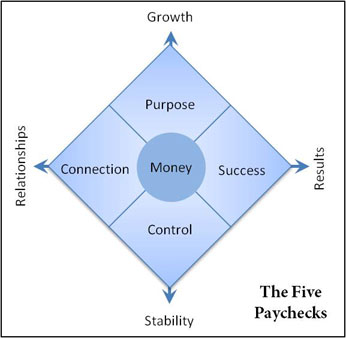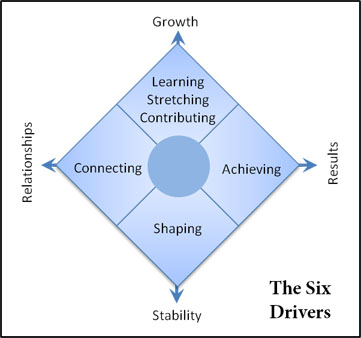
Would you like to be able to give yourself a raise, whenever you want, without your boss even knowing? No, we're not talking about fraud. This is completely legal and ethical. In fact, your boss will likely thank you for it.

Here's the deal. Most people, most of the time, measure the value of their work strictly by how much they get paid. But every employee actually receives five paychecks, four of which are largely under your control. (These are shown in the adjacent diagram, along with the corporate values they correspond to.)
1. Money. This is the obvious one. Wages, benefits, bonuses, profit sharing -- money matters, and we'd all love to have more of it. But particularly in this economy, going to your boss and demanding a bigger salary is usually not going to be all that effective. So let's look at the other four paychecks.
2. Control. How much freedom do you have in your job? Can you work from home? Create a flexible schedule? Influence your job description? Companies used to offer control in the form of lifelong employment. No longer. The U.S. Department of Labor estimates that today's graduates will have ten to fourteen jobs by the age of thirty-eight. That doesn't mean you don't have control of your job any more. It means you need to learn how to create it.
3. Success. How do you define success? One way is with the three P's: pay, power and promotions. Yet underneath each of these is something deeper -- the basic human drive for achievement. I don't know about you, but I love achieving a goal. You can receive the joy that comes from achievement in many ways: video games, athletics, game shows -- or as something you create at work.
4. Connection. How much of yourself do you bring to work each day? Do you just bring your body and mind, and perhaps a bit of your personality? Or do you bring your heart as well? Do you share who you really are with others, and build meaningful relationships? Deep relationships are highly rewarding -- they're one of the most valuable things you can create, in almost any company or career.
5. Purpose. What gives life its meaning? Do you need to save the planet and find enlightenment -- or is there another way? There are four primary things that create meaning. Connection is one. The other three, which make up the fifth paycheck, are growth, contribution and creativity. Life has purpose when we're learning and growing; when we're giving, serving and contributing; and when we're tapping into inspiration and creativity.
Lasting happiness comes from learning how to fill our lives with a measure of control, a feeling of success, the experience of connection, and a sense of purpose. The problem is that most people forget this and just focus on the first paycheck.
We may tell ourselves that "once I have more money, work for the right company, or have a better job, then I'll be happy." We may blame others, and complain about how miserable our boss and coworkers make us feel. Or we may wait for someone else to fix our working conditions, so they'll finally measure up to our expectations. The problem is that when we do this, we give up our power. We make it harder to be happy. And we reduce the value we're able to provide, which makes it that much more difficult to make the money we want.
That's one choice. The other choice is to focus on how you can give yourself a raise, by increasing the level of control, success, connection and purpose you experience at work. Done in a productive way, this creates a win/win. It increases the value you contribute and it increases the value you receive. And over time, it usually leads to getting more of the three P's as well.
So how do we do this? I just finished reading a terrific book, The Employee Engagement Mindset by Timothy R. Clark and team, which provides step by step instructions on how to do so. It's the best book I've read on the topic of employee engagement -- what it is, why it matters, and how to create more of it.
From the company's perspective, engagement is basically a measure of how much employees care about their work. As Dr. Clark says, "Engagement is the passion you have for what you're doing and the affection you have for the organization and its people." It's the single best predictor of productivity.
For example, Best Buy has found that every 0.1 percent increase in a store's level of employee engagement translates into more than $100,000 of additional annual income.
From the employee's perspective, engagement is one of the primary predictors of long term happiness and success. Engagement is basically a measure of the true compensation you're receiving from the five paychecks, which is why increasing your level of engagement is the easiest and most effective way to give yourself a raise.
The recipe for doing so is simple, but it's definitely not a "get rich quick scheme." It first requires deciding that you want to become more highly engaged. Not because you think you should, or just because you want to make more money, but because you genuinely want to get more from your career.
The second step is to take ownership of your engagement. In studying 150 highly engaged employees across 50 different organizations, Clark's team found this to be the top predictor of engagement.
99% of highly engaged employees report that they take personal and primary responsibility for their own engagement. While most highly engaged employees embrace an employee-centered model of engagement (meaning 'I own it; it's up to me; I'm responsible for my own engagement'), most disengaged employees follow an employer-centered model (meaning 'It's my manager's or the organization's job to keep me engaged.')
The whole point of this process is it's something you can do to give yourself a raise, rather than being dependent on others. While your company can help, engagement is something you create.

Then the third step is to master the different ways of creating engagement. While we use different language (I call them the five paychecks, Clark's team calls them the six drivers of engagement) the principles are the same, and their book provides simple, detailed, powerful instructions for how to master each one.
The bottom line is this. Do you want more from your work? Do you want more for your company? Then own your own engagement, learn how to give yourself a raise and teach others how to do the same.